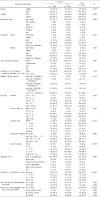1. Cheong JY, Kim MJ, Kim YA, Ly SY. Effect of breakfast eating on lening attitude, academic efficacy and self-rated mental health of the 5th grade students of primary school in Daejeon city in Korea. Korean J Hum Ecol. 2014; 23(4):709–720.
2. Bae AY. Relationship between schoolworks and breakfast intake of middle school students [dissertation]. Busan: Dong-A University;2009.
3. Choe JS, Chun HK, Chung GJ, Nam HJ. Relations between the dietary habit and academic achievement, subjective health judgement, physical status of high school students. J Korean Soc Food Sci Nutr. 2003; 32(4):627–635.
4. Woo LJ, Kim SY. Association between breakfast frequency and awareness of general school life in high school students. J Korean Soc Food Sci Nutr. 2015; 44(6):854–861.

6. Sampasa-Kanyinga H, Willmore J. Relationships between bullying victimization psychological distress and breakfast skipping among boys and girls. Appetite. 2015; 89(1):41–46.

7. Hoyland A, Dye L, Lawton CL. A systematic review of the effect of breakfast on the cognitive performance of children and adolescents. Nutr Res Rev. 2009; 22(2):220–243.


8. Chung YC, Park CH, Kwon HK, Park YM, Kim YS, Doo JK, et al. Improved cognitive performance following supplementation with a mixed-grain diet in high school students: a randomized controlled trial. Nutrition. 2012; 28(2):165–172.


9. Park EO, Oh MR, Choi EK, Shin DH, Doo JK, Kim YS, et al. Mixed grain containing giant embryonic brown rice improves postprandial glycaemic response in healthy subjects. Nutr Diet. 2016; 73(2):132–138.

11. Jung SJ, Kim MG, Park TS, Kim YG, Song WO, Chae SW. Rice-based Korean meals (bibimbap and kimbap) have lower glycemicresponses and postprandial-triglyceride effects than energy-matched Western meals. J Ethnic Foods. 2015; 2(4):154–161.
12. Byun MS, Yu OK, Cha YS, Park TS. Korean traditional Chungkookjang improves body composition, lipid profiles and atherogenic indices in overweight/obese subjects: a double-blind, randomized, crossover, placebo-controlled clinical trial. Eur J Clin Nutr. 2016; 70(10):1116–1122.


13. Kwon SJ, Sung SJ, Ly SY. The interrelations among nutrition education, satisfaction with school lunch, school lunch leftovers and self-rated mental or physical health: the elementary school children in Daejeon area. Korean J Community Nutr. 2010; 15(1):94–107.
14. Kim YS, Yoon JH, Kim HR, Kwon SO. Factors related to eating breakfast of middle and high school students in Seoul. Korean J Community Nutr. 2010; 15(5):582–592.
15. Beak YM, Jung SJ, Beak HI, Cha YS. A study on eating out and snack intake of elementary school students living in Jeonbuk province. Korean J Hum Ecol. 2007; 10(2):77–87.
16. Lee EO, Lee EH, Choe E. Food intake and preference for breakfast of middle school students in Incheon. Korean J Food Cookery Sci. 2013; 29(5):563–571.

17. Jung SJ, Chae SW, Sohn HS, Kim SB, Rho JO, Baik SH, et al. Actual status of constipation and life factors affecting constipation by diagnosis of Rome in female university students in Korea. Korean J Nutr. 2011; 44(5):428–442.

18. Choi MY, Kim HY. Nutrition knowledge, dietary self-efficacy and eating habits according to student's stage of regular breakfast or exercise. Korean J Community Nutr. 2008; 13(5):653–662.
19. Choi JH, Park GS. Study on breakfast status and perception of substitution foods for breakfast in high school students in Daegu area. J East Asian Soc Diet Life. 2016; 26(6):565–574.

20. Chung SJ, Lee Y, Kwon S. Factors associated with breakfast skipping in elementary school children in Korea. Korean J Community Nutr. 2004; 9(1):3–11.
21. Sung C, Sung M, Choi M, Kim M, Seo Y, Park E, et al. Comparison of the food and nutrition ecology of elementary school children by regions. Korean J Community Nutr. 2003; 8(5):642–651.
22. Yi BS, Yang IS. An exploratory study for identifying factors related to breakfast in elementary, middle and high school students. Korean J Community Nutr. 2006; 11(1):25–38.
23. Lee SE. A study on the status of skipping breakfast and dietary behavior for high-grade elementary school students in Gyeonggi area [disseratation]. Seoul: Myongji University;2008.
24. You JS, Kim SM, Chang KJ. Nutritional knowledge and dietary behavior of the 6th grade elementary school students in Daejeon area by gender and skipping breakfast. Korean J Nutr. 2009; 42(3):256–267.
25. Sung SJ, Kwon S. Effect of eating with family or alone on the self-rated mental or physical health: the elementary school children in Daejeon area. Korean J Community Nutr. 2010; 15(2):206–226.
26. Yi HJ, Chyun JH. A study on the relationship between food habits, food preferences and personality traits of children. J Korean Home Econ Assoc. 1989; 27(2):85–95.
27. Park SM. Intervention effect of intrinsic motivation enhancing strategy on academic efficacy and learning attitude [dissertation]. Gyeongsan: Daegu University;2008.
28. Bandura A, Schunk DH. Cultivating competence, self-efficacy and intrinsic interest through proximal self-motivation. J Pers Soc Psychol. 1981; 41(3):586–598.

29. Pintrich PR, de Groot EV. Motivational and self-regulated learning components of classroom academic performance. J Educ Psychol. 1990; 82(1):33–40.

30. Schunk DH. Effects of effort attributional feedback on children's perceived self-efficacy and achievement. J Educ Psychol. 1982; 74(4):548–556.

31. Kim SA, Lee BH. Relationships between the nutrient intake status, dietary habits, academic stress and academic achievement in the elementary school children in Bucheon-si. Korean J Nutr. 2008; 41(8):786–796.
32. Cheong JY, Lee SY. Learning attitude and academic efficacy of the 5th grade elementary school students in Daejeon area by skipping breakfast. In : 2012 Summer Conference; 2012 Jun 1; Daejeon University Hyehwa Culture Center. Seoul: Korean Association of Human Ecology;2012. p. 153–154.








 PDF
PDF ePub
ePub Citation
Citation Print
Print





 XML Download
XML Download